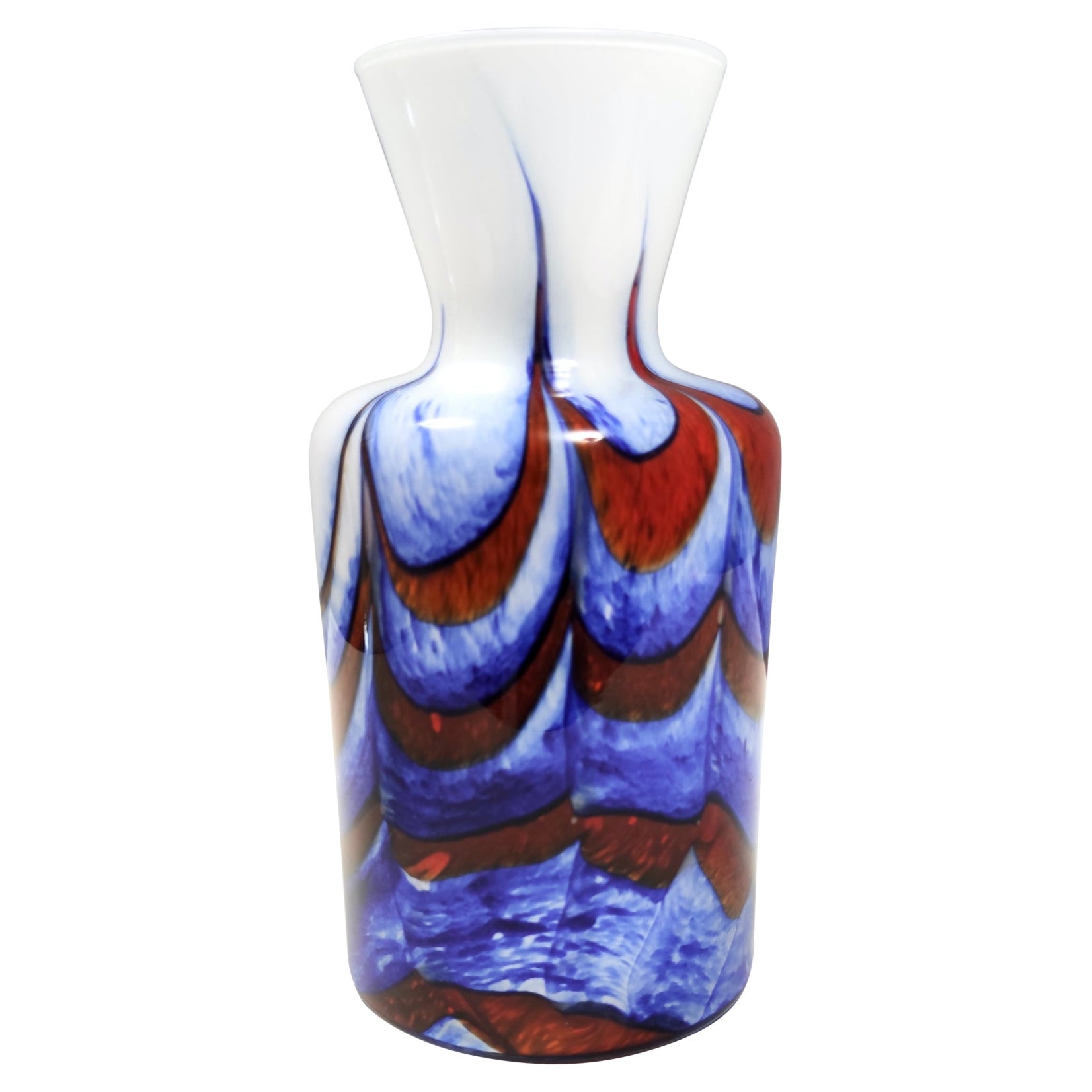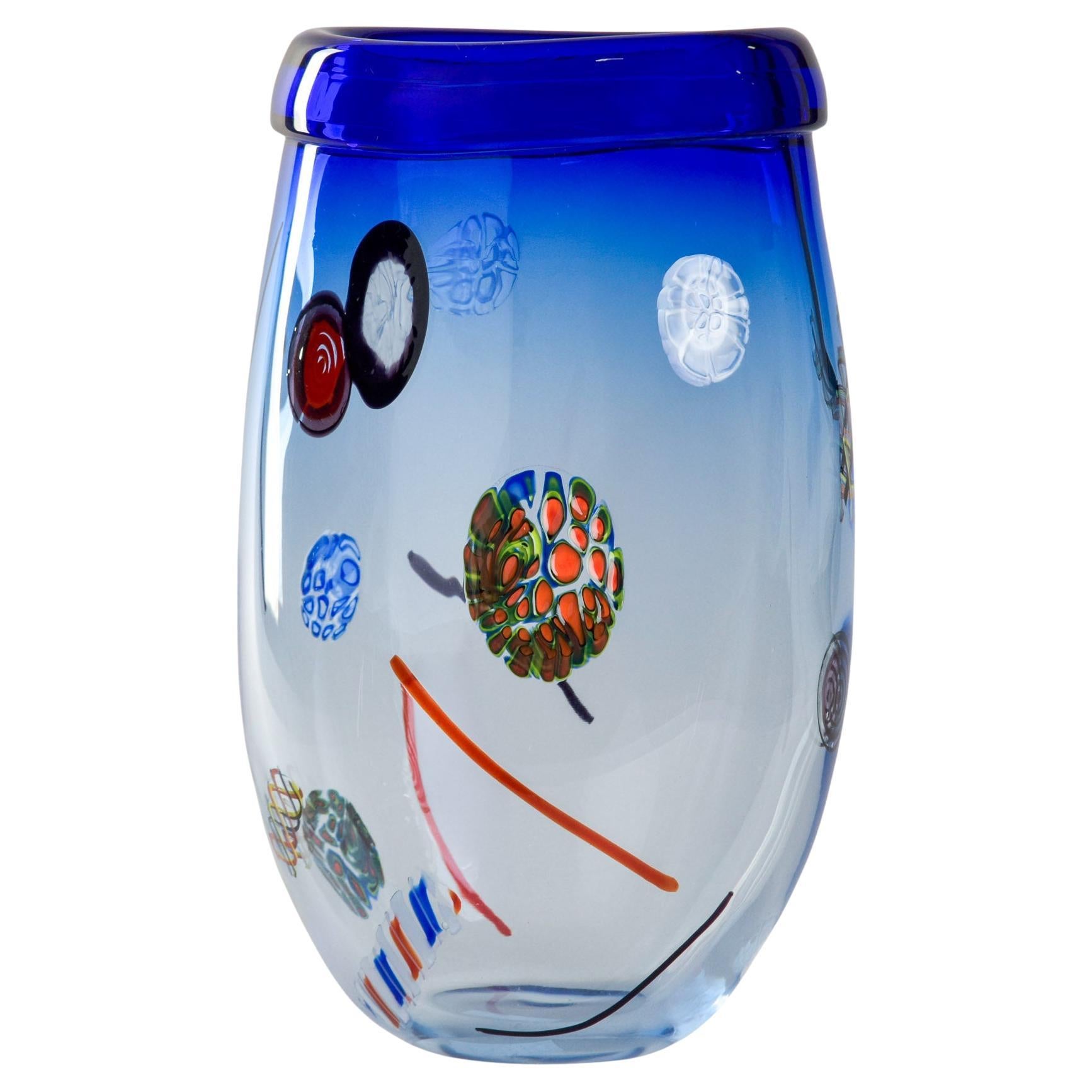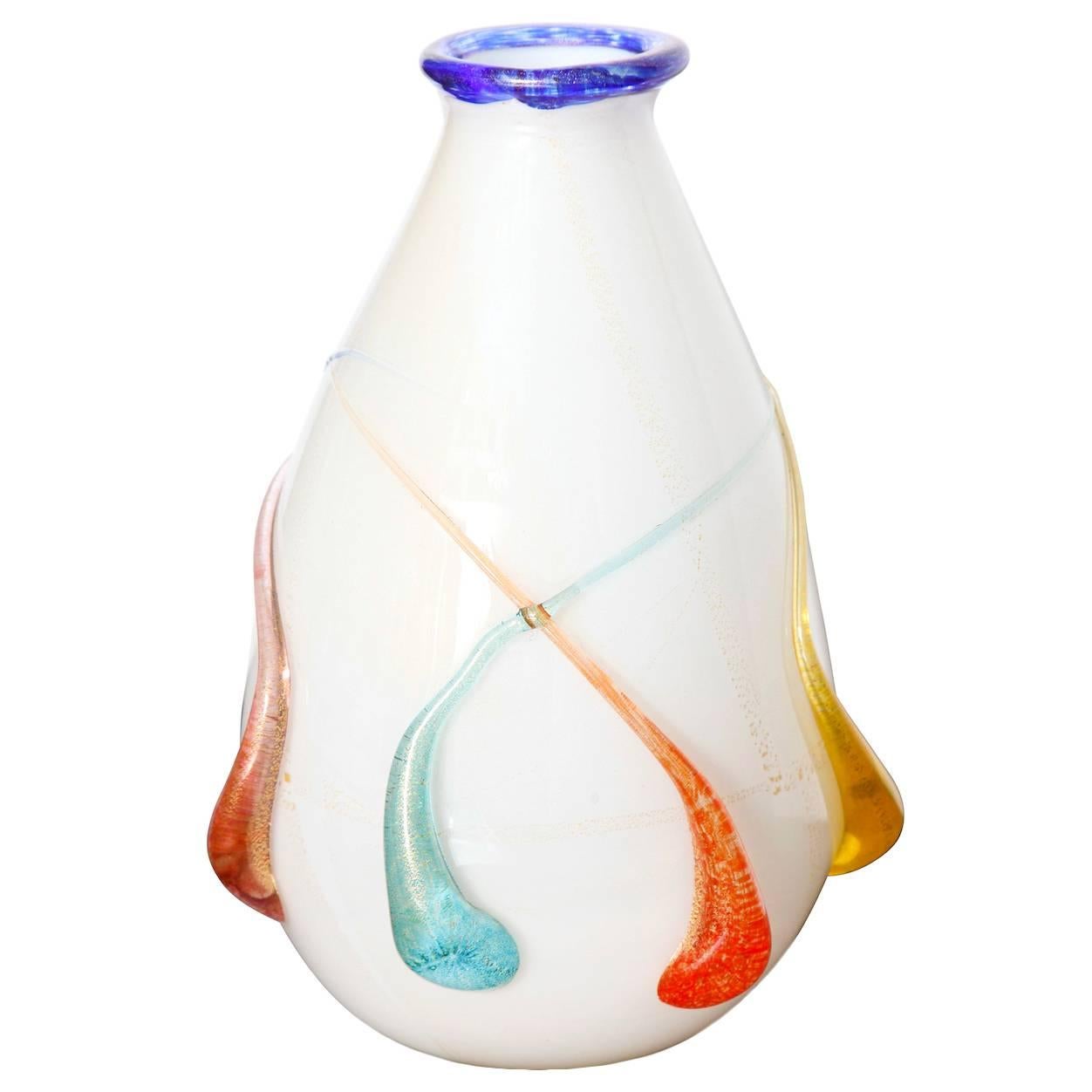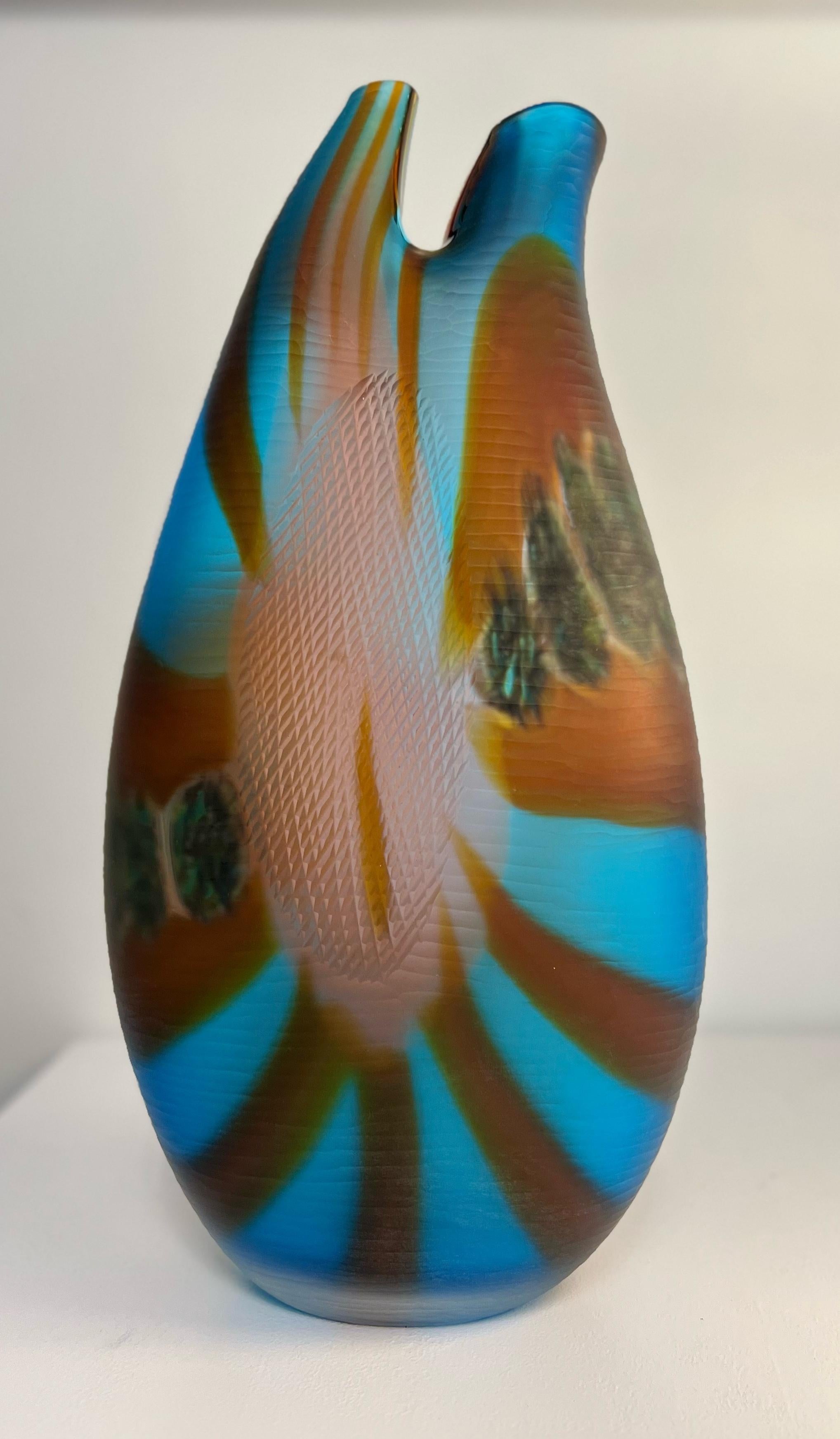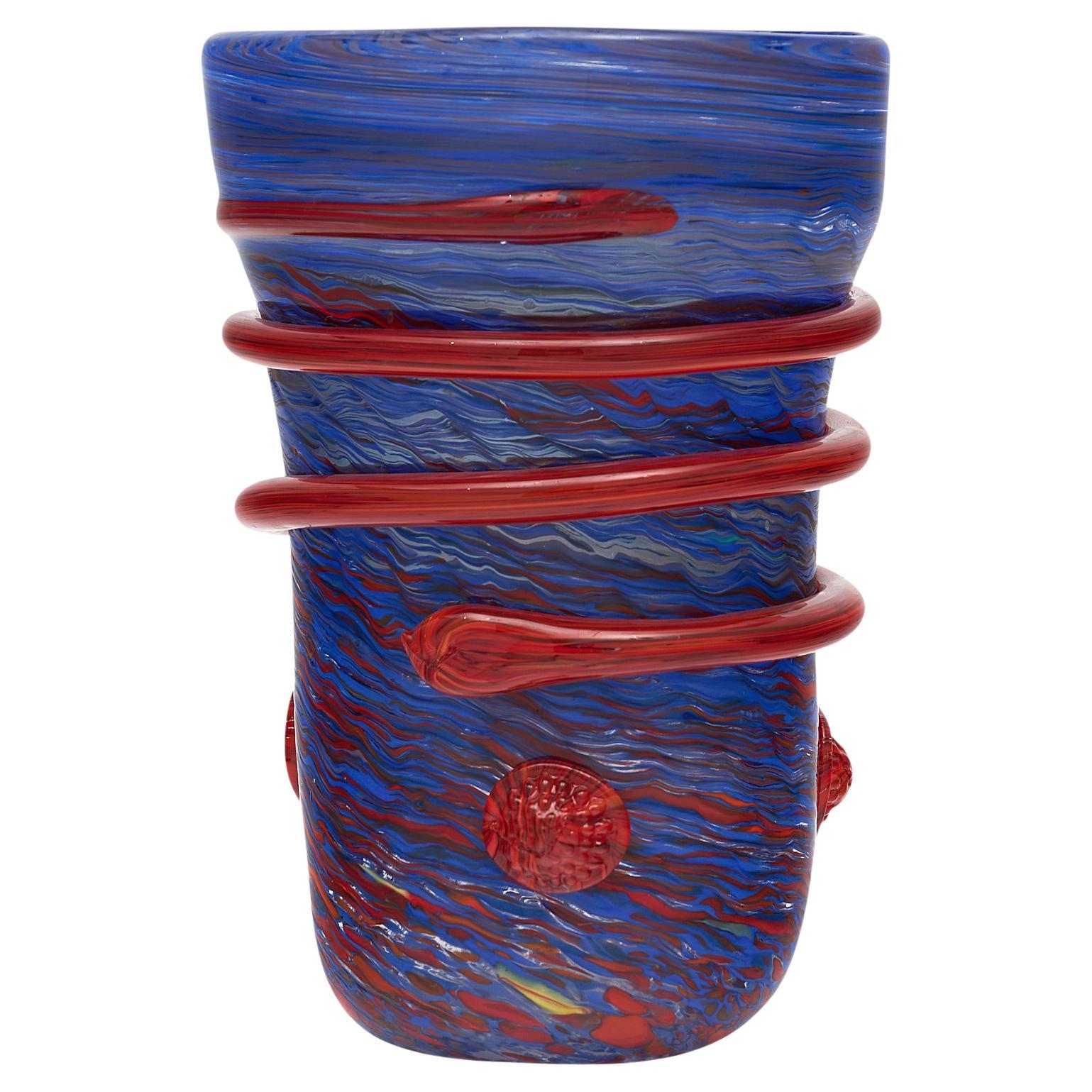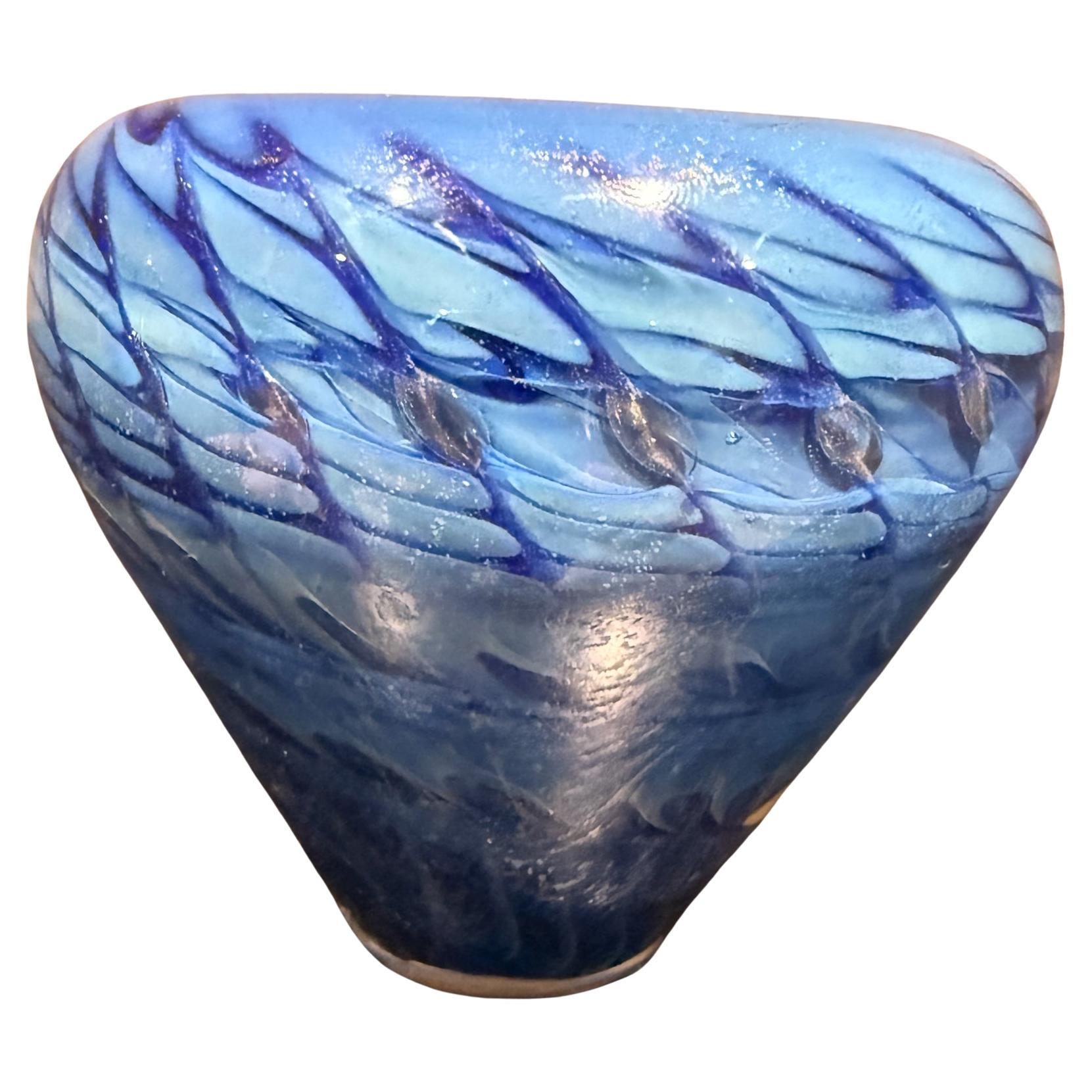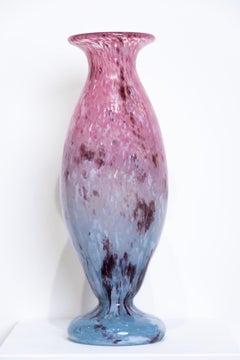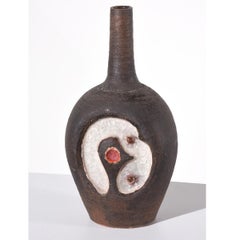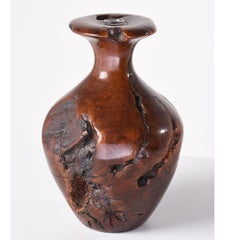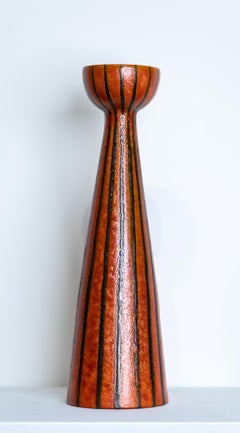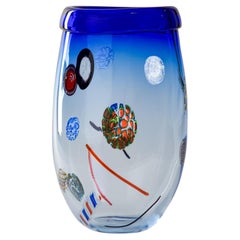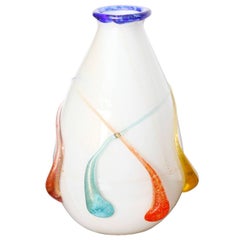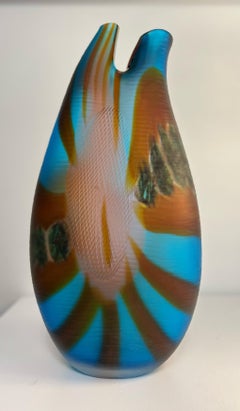Items Similar to Herb Babcock "Glass Vase" Blown Glass White & Blue Background Red Splashes
Want more images or videos?
Request additional images or videos from the seller
1 of 9
Herb BabcockHerb Babcock "Glass Vase" Blown Glass White & Blue Background Red Splashes1978
1978
$2,800
£2,105.41
€2,434.50
CA$3,951.57
A$4,287.66
CHF 2,274.52
MX$52,652.07
NOK 28,128.44
SEK 26,637.60
DKK 18,172.53
About the Item
"Blown Glass" vase is a light beautiful wisp of blown glass infused with a milky white and blue fog of color and bold splashes of red. The vase has a long elegant neck and round body.
Herb Babcock known as a Michigan Glass Artist began as a metal sculptor. He studied glass blowing in 1969 and created a series of Glass Image Vessels in 1974. Eventually he began to combine metal and glass in sculpture. The Pillared Series, which includes glass, steel and stone, began in 1989.
Herb received both his BFA and his MFA in Sculpture: his bachelor’s degree from the Cleveland Institute of Art and his master’s from the Cranbrook Academy of Art Bloomfield Hills, Michigan. Cranbrook was designed by architect and faculty member, Eliel Saarinen who collaborated with Charles and Ray Eames on chair and furniture design. Numerous creative artists who are alumni of Cranbrook include: Harry Bertoia, Florence Knoll, Jack Lenor Larsen, Donald Lipski, Duane Hanson, Nick Cave, Hani Rashid, George Nelson, Urban Jupena (Nationally recognized fiber artist), Artis Lane (the first African-American artist to have her sculpture, "Sojourner Truth," commissioned for the Emancipation Hall in the Capital Visitor Center in Washington DC), Cory Puhlman (televised Pastry Chef extraordinaire), Thom O’Connor (Lithographs), Paul Evans (Brutalist-inspired sculpted metal furnishings), Eugene Caples (small bronze images/abstract), and Morris Brose (Bronze Sculptures.)
He also studied Sculpture at the Skowhegan School of Painting and Sculpture in Maine as a resident artist. Other well-known artists studied at Skowhegan: Lee Bontecue, Robert Indiana, Alex Katz, and Ellsworth Kelly, Berenice Abbott was on faculty. Babcock also studied glass at the Toledo Museum of Art, Toledo, Ohio.
He is currently an independent studio artist and Professor Emeritus after 40 years as the Glass Department Chairman, College for Creative Studies, Detroit, Michigan. College for Creative Studies (formerly Center for Creative Studies) faculty and graduates include Richard Jerzy, Harry Bertoia, Doug Chaing (currently director of Lucas Film), Stephen Dinehart (game maker, writer, designer connected with The David Lynch Foundation), Tyree Guyton (international artist), Jerome Feretti, Kevin Siembieda (writer, designer and publisher of role-playing games), Renee Radell, Philip Pearlstein, Charles McGee (nationally recognized African American sculptor of animal and dancing spirits), Philip Pearlstein (2000 Honorary Doctorate, Modern Realism style), John Louis Krieger (American Modern), and William Girard (American Modern.)
Babcock is represented by Habatat Galleries in Royal Oak, Michigan, and West Palm Beach, Florida, Echt Gallery in Chicago, Illinois, Imago Galleries in Palm Desert, California, Sandra Ainsley Gallery in Toronto, Canada, and Austin Art Projects in Palm Desert, California. His work is represented in galleries, museums and collections both nationally and internationally and includes large scale municipal public art projects. Herb’s background is predominately metal fabrication.
- Creator:Herb Babcock (1946)
- Creation Year:1978
- Dimensions:Height: 8 in (20.32 cm)Width: 4.5 in (11.43 cm)
- Medium:
- Movement & Style:
- Period:
- Condition:
- Gallery Location:Detroit, MI
- Reference Number:1stDibs: LU128615258672
About the Seller
5.0
Vetted Professional Seller
Every seller passes strict standards for authenticity and reliability
Established in 2014
1stDibs seller since 2019
108 sales on 1stDibs
Typical response time: 16 hours
- ShippingRetrieving quote...Shipping from: Detroit, MI
- Return Policy
Authenticity Guarantee
In the unlikely event there’s an issue with an item’s authenticity, contact us within 1 year for a full refund. DetailsMoney-Back Guarantee
If your item is not as described, is damaged in transit, or does not arrive, contact us within 7 days for a full refund. Details24-Hour Cancellation
You have a 24-hour grace period in which to reconsider your purchase, with no questions asked.Vetted Professional Sellers
Our world-class sellers must adhere to strict standards for service and quality, maintaining the integrity of our listings.Price-Match Guarantee
If you find that a seller listed the same item for a lower price elsewhere, we’ll match it.Trusted Global Delivery
Our best-in-class carrier network provides specialized shipping options worldwide, including custom delivery.More From This Seller
View All"Untitled Vase" Blown Glass, Pink & Blue, Speckled, Sparkling, Signed by Artist
By Charles Schneider
Located in Detroit, MI
This speckled and sparkling glass vase is an exemplary piece of the Art Nouveau period of France and was created by legendary glass-smith Charles Schneider. The pink and blue speckle...
Category
Early 1900s Art Nouveau More Art
Materials
Glass
Aldo Londi Vase Abstract "Glass Fused Ceramic Vase"
Located in Detroit, MI
"Glass Fused Ceramic Vase" is vintage Mid-Century Modern. This handsome vase has an elongated neck with a white glass-fused inlay portion on the front body...
Category
Mid-20th Century American Modern More Art
Materials
Ceramic, Glass
"Barcus Burlwood Vase I" Turned Burlwood Polished Rough, Glass Insert
Located in Detroit, MI
This turned Burlwood vase has rich earth tones with copper highlights. The swirling burl pattern comes through the glossy surface that contrasts with the...
Category
1970s Modern Still-life Sculptures
Materials
Wood
"Mid-Century Modern Red Vase" Burnished Red, Black Stripe, Ceramic
By Dante Baldelli
Located in Detroit, MI
The Mid-Century Modern red vase by Dante Baldelli is an elegant example of the work his studio could produce for the consumer to enhance the décor of th...
Category
Mid-20th Century Modern More Art
Materials
Ceramic, Glaze
John Glick Plum Street Pottery Glazed Bowl Reduction Fired
Located in Detroit, MI
"Untitled" is a stoneware piece with the decorative layer of the rich toned glazes and markings that John was so well-known for. Each piece that John produced was unique. The lip on this piece is slightly scalloped and the shape is removed from the boring circular to mimic a gentle geometric design. He was seduced by the effects of the reduction kiln, which decreased the levels of oxygen during firing, inducing the flame to pull oxygen out of the clay and glazes changing the colors of the glazes depending on their iron and copper content. In this way he achieved the rich gradients of ochre and umber and variations in stippling and opacity. This piece is signed and stamped on the bottom.
John was an American Abstract Expressionist ceramicist born in Detroit, MI. Though open to artistic experimentation, Glick was most influenced by the styles and aesthetics of Asian pottery—an inspiration that shows in his use of decorative patterns and glaze choices. He has said that he is attracted to simplicity, as well as complexity: my work continually reflects my re-examination that these two poles can coexist… or not, in a given series. Glick also took influences from master potters of Japan, notably Shoji Hamada and Kanjrio Kawai, blending their gestural embellishments of simple forms with attitudes of Abstract Expressionism. He was particularly drown to the work of Helen Frankenthaler whose soak-stain style resonated with Glick’s multi-layered glaze surfaces, which juxtaposed veils of atmospheric color with gestural marks and pattern. He spent countless hours developing and making his own tools in order to achieve previously unseen results in his work with clay and glaze.
Glick’s “Plum Tree Pottery...
Category
1970s American Modern Abstract Sculptures
Materials
Stoneware, Glaze
"Stoneware Vessel" Cream Glaze with Organic Decorations, Signed
By Gawaine Dart
Located in Detroit, MI
The rich tones of the stoneware clay come through the soft creamy glaze that drips over the surface like melted vanilla ice cream over red devil cake. This beautifully rendered ceramic vessel is perched on little decorative feet that poke out of the body of the piece. Of particular interest and commanding presence are the decorative forms attached to the top and sides. They twisted shapes of bent organic growth and provide endless entertainment for the creative imagination.
American Post War and Contemporary Artist, Gawaine Dart...
Category
1980s More Art
Materials
Stoneware, Glaze
You May Also Like
Postmodern Red, White and Blue Murano Glass Vase by Carlo Moretti, Italy
By Carlo Moretti
Located in Bresso, Lombardy
Made in Italy, 1970s.
Made in Murano glass.
It might show slight traces of use since it's vintage, but it can be considered as in excellent original condition and ready to become a ...
Category
Vintage 1970s Italian Post-Modern Vases
Materials
Murano Glass
Vintage Tall Murrine Murano Glass Vase with Blue Rim
Located in Troy, MI
Found in Italy, this unsigned vintage Murano glass vase dates from the 1980s. This piece is over 12” tall with a deep cobalt blue rim, and a clearer, less saturated blue body embelli...
Category
Mid-20th Century Italian Mid-Century Modern Vases
Materials
Murano Glass
Studio Made Murano Glass Vase
Located in New York, NY
Unusual vase form of white glass with internal glass foil, and applied blue lip at opening. multicolored glass whips applied all around the body of the vase.
Category
Vintage 1960s Italian Mid-Century Modern Vases
Junonia, Hand Blown Murano Glass Vase, Multicolor
Located in Miami, FL
The JUNONIA vase is a creation by the renowned Venetian glass master Afro Celotto. The dimensions of this artwork are 18.25" x 9" x 4.5".
Every vase is hand signed at the bottom by...
Category
2010s Abstract More Art
Materials
Glass, Blown Glass
$2,480 Sale Price
20% Off
Murano Glass Blue and Red Vase
Located in Austin, TX
Murano glass vase, Italian, from the Island of Murano. This hand-blown glass piece is made with multicolored glass in blue and red tones and has an organic movement.
Category
2010s Italian Mid-Century Modern Vases
Materials
Murano Glass
$2,175 Sale Price
25% Off
Tim Lazer Art Glass Vase Blue Post-Modern 1990
Located in Chula Vista, CA
For your consideration, an art glass vase designed by Tim Lazer (signed on the bottom). Blue tones in swirl motion. Post-modern , dated 1990.
Dimensions: 3.5" H x 3.75" diameter.
P...
Category
1990s American Post-Modern Vases
Materials
Art Glass
